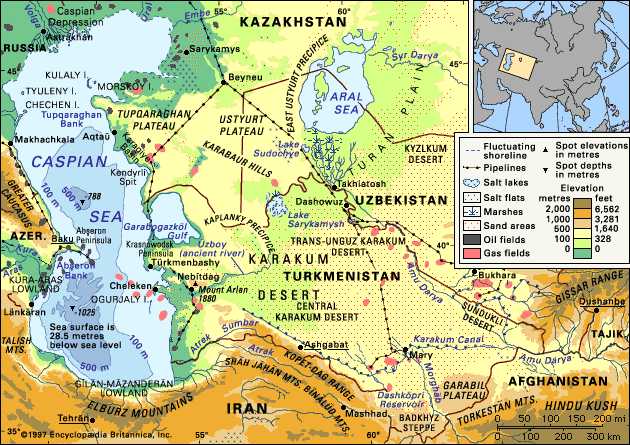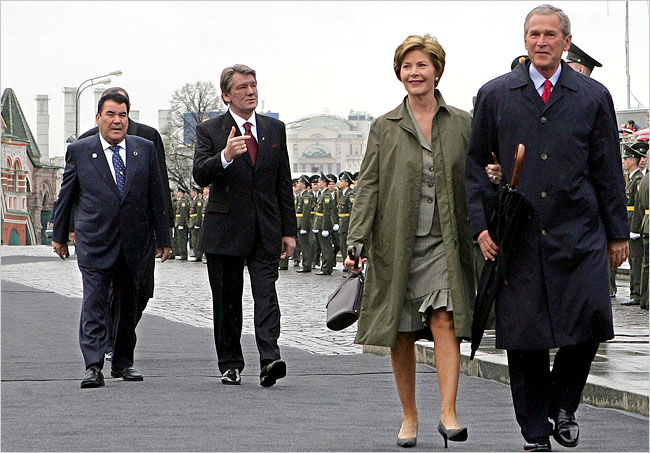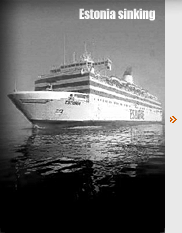The War For Caspian Oil And Gas
By Christopher Bollyn
President Bush's "crusade" against the Taliban of Afghanistan has more to do with control of the immense oil and gas resources of the Caspian Basin than it does with rooting out terrorism.

Once again an American president from the Bush family is leading Americans down an oil-rich Middle Eastern warpath against enemies of freedom and democracy.
President George W. Bush, whose family is well connected to oil and energy companies, has called for an international crusade against Islamic terrorists, who he says hate Americans simply because we are "the brightest beacon of freedom."
The focus on religion-based terrorism serves to conceal important aspects of the Central Asian conflict. President Bush's noble rhetoric about fighting for justice and democracy is masking a less noble struggle for control of an estimated $5 trillion of oil and gas resources from the Caspian Basin.
One of the material results of the elder Bush's Desert Storm military campaign in 1991 was to secure access to the huge Rumaila oil field of southern Iraq, which was accomplished by expanding the boundaries of Kuwait after the war. This allowed Kuwait, a former British protectorate where American and British oil companies are heavily invested, to double its prewar oil output.
The Trepca mine complex in Kosovo, one of the richest mines of Europe, was seized last year by George Soros and Bernard Kouchner, two Jewish members of the New World Order gang who devastated Serbia.
A similar geopolitical strategy, influenced by Zionist planners, to control the valuable mineral resources of the Caspian Basin underlies the planned aggression against Afghanistan, a Central Asian nation that occupies a strategic position sandwiched between the Middle East, Central Asia, and the Indian subcontinent.
Central Asia has enormous quantities of undeveloped oil resources, including some 6.6 trillion cubic meters of natural gas, waiting to be exploited. The former Soviet republics of Uzbekistan and Turkmenistan are the two major gas producers in Central Asia.
Today, the only existing export routes from the area lead through Russia. Investors in Caspian oil and gas are interested in building alternative pipelines to Turkey and Europe, and especially to the rapidly growing Asian markets.
India, Iran, Russia, and Israel, are working on a plan to supply oil and gas to south and southeast Asia through India but instability in Afghanistan is posing a great threat to this effort.
Afghanistan lies squarely between Turkmenistan, home to the world's third-largest natural gas reserves, and the lucrative markets of the Indian subcontinent, China and Japan. A memorandum of understanding has been signed to build a 900-mile natural gas pipeline from Turkmenistan to Pakistan via Afghanistan, but the ongoing civil war and absence of a stable government in Afghanistan have prevented the project from going forward.
Afghanistan was at the center of the so-called "Great Game" in the 19th century when Imperial Russia and the British Empire in India vied for influence. Today, its geographical position as a potential transit route for oil and natural gas pipelines, makes Afghanistan an extremely important piece of a global strategy by energy magnates to obtain control over these precious resources.
Enron, a Texas-based gas and energy company, together with Amoco, British Petroleum, Chevron, Exxon, Mobil and Unocal are all engaged in a multi-billion dollar frenzy to extract the reserves of Azerbaijan, Kazakhstan, and Turkmenistan, the three newly independent Soviet republics that border on the Caspian Sea.
On behalf of the oil companies, an array of former cabinet members from the elder Bush administration have been actively involved in negotiations with the former Soviet republics. The dealmakers include James Baker, Brent Scowcroft, Dick Cheney, and John Sununu.
Turkmenistan and Azerbijan are also both closely allied with Israeli commercial interests and Israeli military intelligence. In Turkmenistan, a former Israeli intelligence agent, Yosef A. Maiman, president of Merhav Group of Israel, is the official negotiator and policy maker responsible for developing the energy resources of Turkmenistan.
"This is the Great Game all over," Maiman told The Wall Street Journal about his role in furthering the "geopolitical goals of both the U.S. and Israel in Central Asia. "We are doing what U.S. and Israeli policy could not achieve," he said, "Controlling the transport route is controlling the product."
"Those that control the oil routes out of Central Asia will impact all future direction and quantities of flow and the distribution of revenues from new production," said energy expert James Dorian recently in Oil & Gas Journal on September 10, 2001.
Foreign business in Turkmenistan is dominated by Maiman's Merhav Group, according to The Washington Report on Middle East Affairs (WRMEA). Maiman, who was made a citizen of Turkmenistan by presidential decree, serves as Turkmenistan's official negotiator for its gas pipeline, special ambassador, and right-hand man for the authoritarian President Saparmurad Atayevich Niyazov, a former Politburo member of the Central Committee of the Communist Party of the Soviet Union.
The Merhav Group of Israel officially represents the Turkmen government and has brokered all of the energy projects in Turkmenistan, contracts worth many billions of dollars.
Merhav has been contracted to modernize existing natural gas infrastructure and will build new facilities in an oil refinery in the city of Turkmenbashi on the Caspian Sea. Merhav refuses to disclose its sources of financing.
In keeping with Israeli political interests, Maiman's planned pipelines bypass Iran and Russia. Maiman has said that he would have no objection to dealing with Iran, "when and if Israeli policy allows it."
Iran has accused the U.S. of trying to keep regional pipelines from passing through Iran. Creating a counterbalance to Iran's regional influence was a cornerstone of the Clinton administration, which was concerned that Iran could gain too much control over Caspian exports.
"This is a common interest for the U.S. and Israel," said Dr. Nimrod Novik, vice president of Merhav, "The primary interest is to prevent the development of Turkish strategic dependence on Iran, given the unique emerging strategic relationship between Turkey and Israel."
Russia and Turkmenistan are in a battle to conquer the Turkish gas market, the supplier that offers the best price for its gas will emerge as the winner. "This is a great race," Maiman says, "Whoever takes Turkey first wins. Whoever comes second will have lean years."
Although the U.S. needs Russian assistance in its campaign against Afghanistan, when AFP asked Alex Chorine of Caspian Investor what kind of relationship existed between the Russian and Western/Israeli energy companies doing business in the Caspian Basin, Chorine said, "They act as enemies."
One of Maiman's proposed pipelines would bring Turkmenistan's gas and oil to Turkey via Azerbaijan and Georgia. Maiman's Merhav Group is also involved in a $100 million project that would reduce the flow of water to Iraq by diverting water from the Tigris and Euphrates rivers to southeastern Turkey.
Israeli officials boast of having excellent relations with Azerbaijan, where an Israeli company, Magal Security Systems, has a contract to provide security at Baku airport. Magal is one of several Israeli companies that will turn Israel into a major player in Azerbaijan by providing security for the 1,200 mile pipeline taking oil from the Caspian to the Turkish port of Ceyhan on the Mediterranean Sea.
Enron, the biggest contributor to the Bush campaign of 2000, conducted the feasibility study for a $2.5 billion Trans-Caspian gas pipeline, which is being built under a joint venture agreement signed in February 1999 between Turkmenistan and two American companies, Bechtel and General Electric Capital Services. Maiman acted as the intermediary between the Turkmenis and the U.S. firms, but won't discuss his cut or whether he will receive a stake in the pipeline.
The Merhav Group has hired a Washington lobbying firm, Cassidy & Associates, and spent several million dollars to encourage U.S. officials to push for the Trans-Caspian pipeline. During the Clinton administration, Secretary of Energy Bill Richardson and special adviser to the president, Richard Morningstar promoted the Baku-Ceyhan pipeline, calling it "critical to the economic survival of Turkmenistan."
The relationship between Israel, Turkey, and the U.S. is the major factor for the selection of the Baku-Ceyhan route, which could be extended to bring oil directly to energy deficient Israel, however, energy experts question the wisdom and cost of this route. Companies are under pressure from the U.S. and Israel to invest in east-west pipelines, although most companies would prefer cheaper north-south pipelines through Iran, according to WRMEA.
The U.S. firm Unocal was leading a pipeline project to bring Turkmenistan's abundant natural gas through Afghanistan to the growing markets of Pakistan and India, until the turmoil in Afghanistan led them to withdraw from the project in 1998. The planned pipeline would carry gas from the Turkmen Dauletabad fields, among the world's largest, to Multan in Pakistan, with a planned extension to India. The line from Dauletabad through Afghanistan is planned to transport 15 billion cubic feet of gas per year for 30 years. This pipeline is on hold until the political and military situations in Afghanistan improve.
There is a second Unocal project to build a 1,030 mile oil pipeline called the Central Asian Oil Pipeline Project, which would start at Chardzhou in Turkmenistan linking Russia's Siberian oil field pipelines to Pakistan's Arabian coast. This line could transport 1 million barrels a day of oil from other areas of the Former Soviet Union. It would run parallel to the gas line route through Afghanistan and branch off in Pakistan to the Indian Ocean terminal in Ras Malan.
ISRAEL'S SOVIET DICTATORS IN CENTRAL ASIA
Niyazov, the authoritarian president of the Turkmen Soviet Socialist Republic was elected in 1990, and remained in power when Turkmenistan declared independence in October 1991. In May 1992, Niyazov oversaw the passage of a new constitution giving the president extraordinary powers.
Under the new constitution, the president is head of government as well as head of state, and can appoint a prime minister at any time. The president can also appoint and remove all judges.
Niyazov's leadership became increasingly authoritarian during the 1990s. In September 1993 he defended his policy of tight censorship of the press as a prerequisite for stability and peace in the country. In a referendum held in January 1994, nearly 100 percent of the voters endorsed Niyazov's leadership, allowing him to extend his presidency until 2002.
Niyazov renamed himself Turkmenbashi (father of the Turkmen) and presents himself as a prophet and messiah. Every morning, state radio and television (no independent broadcasters exist) transmit the words of a prayer that includes an oath of allegiance to the president along with the traditional appeal to Allah.
Like Turkmenistan, the other Central Asian nations of Uzbekistan, Kazakstan, Kyrgyzstan, and Tajikistan are all ruled by former Communists who came to power under the Soviet system. All five have been re-elected to their posts without opposition, garnering over 90 percent of the votes and securing comfortable lives in the national palaces.
In each of the Central Asian countries a strange and officially imposed dichotomy between "official" and "unofficial" Islam has appeared. Official Islam refers to religious institutions under the control of the state authorities. Unofficial Islam includes all other Muslims, especially those who believe that Islam cannot be controlled by the state power. They are accused of being extremists.
The strength of Islamic fundamentalist movements like the Taliban in Afghanistan and the anti-Russian Chechen rebels threatens the Soviet style dictatorships and their control of the region's immense mineral wealth.
FOCUS ON AFGHANISTAN
Before the sun had set on the apocalyptic day that New York's gleaming twin towers collapsed, the U.S. government had already determined to affix the blame for the kamikaze attacks on the World Trade Center and the Pentagon on Osama bin Laden, the Saudi-born guerilla leader, and the Taliban government of Afghanistan which harbored him.
Although the U.S. government did not present its evidence in support of its case against bin Laden, Secretary of State Colin Powell said on September 23, "I think in the near future, we will be able to put out a paper, a document, that will describe quite clearly the evidence that we have linking him to this attack."
When it was reported that the Taliban might turn bin Laden over to face justice, the Bush administration said that surrendering bin Laden would not prevent an American-led attack on Afghanistan.
An international plan to remove the fundamentalist Islamic Taliban from power has been a subject of international diplomatic discussions for months and was reportedly raised by India during the Group of Eight summit in July in Genoa, Italy.
The Indian press reported in June 2001 that, "India and Iran will facilitate, U.S. and Russian plans for limited military action, against the Taliban if the contemplated tough new economic sanctions don't bend Afghanistan's fundamentalist regime."
The invasion plans described in the Indian press in June may come to pass in October: Tajikistan and Uzbekistan will lead the ground attack with a strong military back up of the U.S. and Russia. Vital Taliban installations and military assets will be targeted.
The economic reasons for the multi-national assault against the Taliban were explained: Uzbekistan, Tajikistan, Kazakhstan, and Turkmenistan are threatened by the Taliban that is aiming to control their vast oil, gas, and other resources by bringing Islamic fundamentalists into power.
What was not explained in the Indian press is how these four predominantly Islamic Central Asian nations would be threatened by having Islamic fundamentalists in power.

Photo: In May 2005, President Bush and Laura Bush joined President Saparmurat A. Niyazov of Turkmenistan and the Ukrainian president, Viktor A. Yushchenko, to mark a World War II anniversary in Moscow.
It should be remembered that Niyazov was a totalitarian dictator "for life" not unlike Stalin. Bush did not seem to mind marching alongside a dictator like Niyazov in 2005 as American boys died for "democracy" in Iraq and Afghanistan. This photo reveals just how shallow and false that claim really is.
What matters most to Bush and his cronies is control of Central Asia and its mineral assets.
Niyazov's death may have been natural or caused by poison or doctoring. What matters most is what comes next. Turkmenistan is a neighbor to Afghanistan and has a long border on Iran's northeastern frontier.
This is key. The border of Turkmenistan is very close to Tehran.
The Israelis have long played a key role in Turkmenistan and their strategy has been to find ways to export the immense oil and gas reserves of Turkmenistan to the West without passing through Russia or Iran.





 The Middle East
The Middle East  The Great Game
The Great Game




